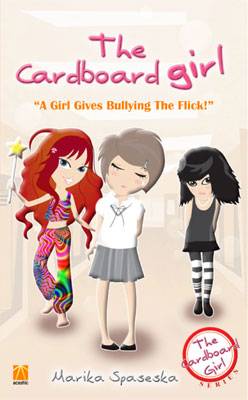The Cardboard Girl: Gives Bullying the Flick

The Cardboard Girl: Gives Bullying the Flick
Meet Cora, who has curly, red hair, wears a cardboard outfit and uses her magical cubby house and special powers to make a difference in children's lives mostly within her primary school environment. She heals, dances and sings. Through her love of magic, Cora is determined to help kids in pain and uses the magical realms of her tree house and cardboard outfit to share her powers and inspire others.
Cora's parents didn't wrap her younger brother or her in cotton wool nor smother them. They were virtually free to explore, use their imagination and achieve things in their lives. At times her mum worried about Cora spending too much time in her cubby house with other kids and not enough time doing her homework!
Cora's aim was to fulfill her role as a healer by helping other kids better deal with problems they face like accepting a step-family and the loss of a pet and show how she turns things around for them.
At least, that's what she thought.
Turns out, she couldn't have been more wrong.
There was a bully at school!
There was a girl.
And during the battle, there seemed to be no light.
Born in Macedonia, former Yugoslavia, Marika Spaseska arrived in Perth, Western Australia, at two years of age.
Despite friendly jibes from her peers that English is her 'second language', she commenced a journalism degree before switching to study Social Work.
Having worked for over 17 years as a Social Worker, Marika has well-recognised clinical, managerial and project/policy work skills.
She is passionate about children's wellbeing and hope's to empower them.
Inspired by a niece who experienced bullying at school, as well as her striking insight as a Social Worker, her first book has the potential to enable children to better deal with those that bully them.
She wants children to aim for the moon and reach it too!
The Cardboard Girl: Gives Bullying the Flick
Acashic Publishing Bookshop
Author: Marika Spaseska
ISBN: 9781447511779
Price: $19.99
Interview with Marika Spaseska
Question: What motivated you to write The Cardboard Girl: Gives Bullying the Flick?
Marika Spaseska: Moved into action by my niece's experiences with bullying in school, I wrote 'The Cardboard Girl: Gives Bullying the Flick', I believe it will touch the hearts of readers, as it shows in a creative, visualisation way how kids feel and act when bullied at school and what can be done to stop or minimise it.
Question: What did your niece experience in regards to bullying?
Marika Spaseska: Physical, as well as verbal bullying. Being pushed out of queues, such as the line for the canteen; hit during recess in the playground and other similar occurrences. I would say that the emotional/verbal bullying had the most detrimental effect on my niece such as nasty/hurtful words and being excluded from playing or friends. Other examples were that the girls who bullied my niece would tell a group of girls an embarrassing story about her, call her mean names, gossip, and come up with ways of letting her know that she was rejected from the peer group. Being bullied negatively impacted on my niece's self esteem, confidence, her ability to form friends and her school performance.
Question: Who did you write The Cardboard Girl for?
Marika Spaseska: Based on over 17-years as a Social Worker, I wrote the book to assist and empower the many children I worked with and for the many others who are bullied at school. The victim in my book becomes a hero in the end, giving a positive, uplifting message to kids.
Question: Were you ever bullied at school?
Marika Spaseska: I experienced little bullying and most of it was in relation to being a 'wog' and I was picked on about my name, etc.
Question: Can you please provide us with some of the top, non-violent do's/don'ts tips for children to stop being bullied?
Marika Spaseska: Top 10 tips to Bully-proof your children include:
Develop and sustain positive, core values. It is vital that children know what is acceptable; to have respect for others, know their boundaries and values. For example, it is NOT okay to exclude others from being friends; it's not okay to put others down, etc.).
Teach kids to care. Encourage kids to show they understand and care for others when they're upset or having a hard time. You want your kids to grow up to understand children's emotions, feelings, their fears, wishes and dreams.
Break down gender roles - girls are expected to be nice and pretty and boys to be manly, rough and outgoing. If you don't conform to this stereotype you can be picked on or put-down. Children can be whoever they want to be. They need to value themselves and not be judgmental of what others do or look like or if they stray from these norms.
Encourage kids to open up about their worries, to talk about things that upset them. By talking about what is happening to someone, be it family, friends, teacher or a counsellor - they will reduce their stress and anxiety levels. There is evidence to suggest that confident children who feel supported by their families and friends are better able to cope with bullying and other pitfalls.
Empower children to take some control themselves over their behaviour (their mood/temper). This will make your life a bit easier and they will feel better, too, if they can learn to better deal with their frustrations. For example, skills they need to learn when frustrated include: walk away, time alone, time out, writing thoughts down, playing or doing something else and talking to someone about what is going on for them. Do not support aggressive behaviour nor conduct yourself in this manner, as children learn directly from parents and others closest to them. Praise them for good behaviour.
Have discussions early with your children about what is bullying and what they can do to stop it. You want to teach your child that if faced with bullying, that they can speak up: tell the kid who is bullying them to stop hurting them or others and that this is unfair. You want your child to be able to tell the 'bully' that what they are saying is nasty and hurtful and that they have no right to speak to them like that. Inspire your children: it's ok to stand up for themselves.
Teach your kids not to watch and be a bystander to bullying. Tell them that if they stay, it may encourage someone who bullies. Support your kids to be able to tell the person who bullies to stop or urge the other child who is being bullied to walk away with them.
Don't allow children to watch violent TV or participate in violent video games.
Urge your children to believe that life gets better - there's a whole world waiting for them outside the school gates.
Question: How will the effects of bullying affect a child's career goals?
Marika Spaseska: Being bullied can devastate a child's sense of enthusiasm for school and learning, self-esteem, and hopes for the future. Children who are bullied may feel depressed, anxious, eat or sleep less or more, have difficulty concentrating on school work and avoid school which may adversely impact on career choices/goals, who they become and what they achieve in life.
Question: How can a parent stop the long-term effects of bullying?
Marika Spaseska: Whether or not your child get's bullied or becomes a 'bully' is still very much down to the environment in which children are raised.
Be aware of factors that may make children more likely to get bullied, including:
children with low self esteem or confidence
appearances e.g. being overweight, wear glasses, be tall with skinny legs
background such as race, socioeconomic factors
academic achievement (being a high achiever, a nerd or 'dumb')
resisting pressure to conform
sexual preferences or behaviour
When a child feels powerless in how they're being treated (bullied), adults usually need to intervene. Parents need to gain insight about what is bullying and what is usual peer conflict. They should also gain an understanding of the severity and duration of these behaviours. For parents, it's important to recognise signs in your child that they are unhappy and address these experiences as they arise. Aim to bring it to the attention of relevant people without reacting aggressively in defence of your child.
You are responsible for your child's self esteem. Children lack the discernment and insight to know that perception or opinion may not be true.
Empower your child's self esteem and confidence and create an environment where your child feels they can openly talk to you. Kids that have low self esteem may not want to tell anyone about being bullied if they feel they deserve this type of treatment (bullying), caused it, or that telling would make it worse.
Kids won't confide in you about bullying and other setbacks unless you have an open, loving relationship with them. Creating a sense of belonging to family is so important - it's the core of resilience. Strive for at least 20 minutes of 'child/you' time without demands and do something fun such as learning music, exercise or other interests. To be healthy and happy we need these ties, as well as relationships outside of the family.
Aim to break down gender roles and challenge your beliefs about acceptable behaviours for boys and girls. Many people see bullying among boys as "just boys being boys." Girls may be raised to be more compliant and boys are taught to fight back. Raise kids with consistent expectations at home and that bullying is not okay, no matter the sex of your child.
It's important to raise your kids with effective conflict/problem solving skills and it starts with you, the parent, and the role model! If you become highly stressed, reactive or highly aggressive and controlling when faced with lifestyle difficulties than chances are that your child may also learn to react and respond to life's stresses in similar ways.
Question: At school, girls have noticed that there are many more girls than boys getting bullied. Why do you think this is?
Marika Spaseska: It is of no surprise that more girls experience bullying than boys and that there are different bullying behaviours between them.
At the core of these differences is children's and, indeed, societal beliefs about acceptable behaviours for boys and girls. Girls are expected to be nice, pretty, tolerant of others and compliant. Girls are not taught to fight back in the same way boys do. Boys are expected to be manly, rough and outgoing, spend more time with other boys in sports and games; whereas girls tend to spend more of their time socialising with other girls in more friendship-based activities (e.g., talking with other girls).
Girls tend to bully other girls through the peer group. Girls more often share with other girls (and boys) hurtful information about the targeted child, exclude them from the peer group, etc. Another example of bullying experienced more often by girls than boys is sexual (e.g., touched in private body parts, other sexual messages).
In contrast to girls, boys of any age and ethnic group tend to display bullying in a physically aggressive manner (e.g., hit, kick, or punch) at all educational levels. Also, boys may be more accepting of bullying, than are girls.
Interview by Brooke Hunter and Morgan Sutherland
MORE





